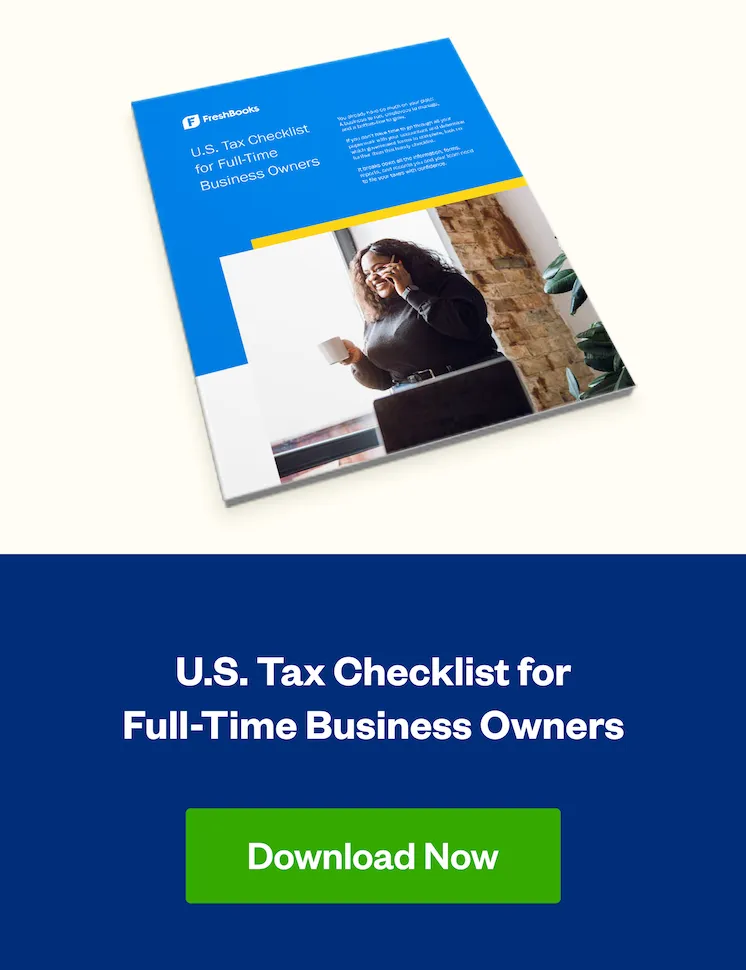Prepare for your tax-time meeting and get a head start on planning your strategy for the next year with these tax questions.

Talking to an accountant during tax time isn’t just a meeting to get through so you can get on with the rest of your year. Your accountant can provide strategic tax advice, answer your income tax questions, and educate you on the most relevant tax changes to know about so you make the best decisions for your business all year. And of course, help you get the best tax refund possible on your tax return.
Treat this meeting with your tax professional as an opportunity to not just file your income taxes, but to make sure you’re getting the support you need to continue growing in the years to come.
Not sure what tax questions to ask? These 7 questions will help guide you through what’s most important during the tax preparation process and beyond.
- 1. What Information Do You Need from Me?
- 2. What Are the Rules for Some Common Business Deductions I Can Make?
- HOME OFFICE DEDUCTION
- INTERNET AND CELL PHONE
- TRAVEL EXPENSES
- VEHICLE EXPENSES
- 3. Do I Qualify for the Qualified Business Income Deduction?
- 4. What Are Some of the Other Changes from the TCJA I Should Know About?
- MEALS AND ENTERTAINMENT DEDUCTION
- BONUS DEPRECIATION
- NET OPERATING LOSS CARRYFORWARD
- 5. Anything Else I Can Do to Reduce My Tax Bill and Improve My Tax Return?
- 6. What Changes Should I Think about Making This Upcoming Year?
- CASH FLOW ANALYSIS TO HELP FIND OPPORTUNITY AREAS
- FINANCIAL FORECASTS AND A BUSINESS BUDGET
- ADVICE ON ESTIMATED TAX PAYMENTS
- 7. Is This Still the Right Business Structure for Me?
- Ask the Right Tax Questions to Get the Most out of Your Accountant
- How a Relationship Coach Uses FreshBooks to Make Tax Time a Breeze (VIDEO)
1. What Information Do You Need from Me?
Because no one wants to drag out the process of filing taxes when really, you just want your tax return, being organized is the best first step to prepare for tax season. Ask your accountant what they need from you and get prepared as early as possible.
Organize your receipts, financial statements, tax return forms, and any additional forms you might need, then get up to date with your bookkeeping. These steps won’t necessarily lower your tax bill, but they will help to reduce the back-and-forth with your accountant.
You can also invite them to FreshBooks so they can generate the free tax reports that they need themselves.
2. What Are the Rules for Some Common Business Deductions I Can Make?
As a business owner, you’re able to deduct certain expenses from your federal income taxes. This is valuable because business deductions decrease your taxable income, which will reduce your tax liability. And if in order, get you the largest tax refund possible on your tax return. You won’t want to forget to take all of your allowable deductions! Your accountant knows your business and can offer tax advice on which deductions you should be able to take.
Some common tax deductions you might have are:
HOME OFFICE DEDUCTION
Is your home your principal place of business? If so, you may be able to take an income tax deduction for the amount of space in your home that is occupied by your business. To qualify, you’ll need to have a separate space that is regularly used exclusively as an office.
INTERNET AND CELL PHONE
If you use the internet and a cell phone for your business, you can claim them as a business deduction. But keep in mind that if you use your internet and your cell phone for both business and personal use, you can only deduct a portion of your bill from your taxable income—more specifically, the percentage that is allocated to your business use.
TRAVEL EXPENSES
If your business has you on the road, you’ll be able to take an income tax deduction for travel expenses that take you away from home. Your accountant can give you more advice on what’s allowed, but some things that are deductible are your transportation, lodging, and meals, which will all help create a healthier tax return. Keeping an organized list of itemized deductions or using accounting software to track expenses can really save time at tax time.
VEHICLE EXPENSES
Do you drive your car for your business often? You’ll likely be able to take a deduction for the business use of your car. The Internal Revenue Service (IRS) allows you to choose the method that makes the most sense (standard mileage rate or actual expenses). Work with your accountant to pick the best approach to reduce your taxable income, and how to properly track these itemized deductions.
3. Do I Qualify for the Qualified Business Income Deduction?
The Tax Cuts and Jobs Act (TCJA) brought about many new changes for business owners. One big change was the qualified business income deduction. The qualified business income (QBI) deduction allows some sole proprietors, S corporations, partnerships, and trusts and estates to deduct up to 20% of their qualified business income.
There are deduction limitations based on your income, but tax professionals can provide more information on whether you qualify for the deduction based on your tax situation and how much it will be.
4. What Are Some of the Other Changes from the TCJA I Should Know About?
The QBI wasn’t the only change that came from the TCJA. You’ll want to ask your accountant about other changes that affect your business. A few changes that may impact you include:
MEALS AND ENTERTAINMENT DEDUCTION
You can continue to deduct 50% of eligible meal expenses, but businesses are no longer able to take a deduction for entertainment expenses.
Note: For the 2021 and 2022 tax years, businesses can deduct 100% of business meals purchased from a restaurant. Congress enacted this temporary change as part of the Consolidated Appropriations Act enacted in 2021 to help restaurants, many of which were hit hard by the COVID-19 pandemic.
BONUS DEPRECIATION
On items where bonus depreciation is allowed (think equipment and computer software), the bonus depreciation amount was increased from 50% to 100%. That means that if you buy a piece of equipment and place it into service, you can write off 100% of the cost that first year.
But 100% bonus depreciation won’t be around forever. Beginning in 2023, the bonus depreciation percentage will decreased by 20 percentage points per year until it reaches zero in 2027.
NET OPERATING LOSS CARRYFORWARD
If your business experiences a loss, you’re no longer able to carry it backward. But you can now carry it forward indefinitely to help offset future income.
Note: The Coronavirus Aid Relief and Economic Security (CARES) Act temporarily and retroactively changed NOL rules. Currently, you can carry back NOLs from tax years beginning in 2018, 2019, and 2020 for five years, or waive the carryback period and carry your NOLs forward to future years.
This temporary provision goes away for tax years beginning in 2021.
5. Anything Else I Can Do to Reduce My Tax Bill and Improve My Tax Return?
This is probably one of the most popular income tax questions. While the tax preparation process will likely be over by the time you meet with your accountant, you may still be able to reduce your tax bill. Talk to your accountant about what other options are available to you. One of the most common ways to reduce your tax liability after the tax year is over is to contribute money to an individual retirement account (IRA) or Simplified Employee Pension (SEP) IRA.
Talk to your accountant to see if this is a strategy you can use and how much you can contribute to your retirement account. There are contribution limits based on your business income and age, but it’s a great way to improve your tax return.
6. What Changes Should I Think about Making This Upcoming Year?
Working with an accountant isn’t just about filing federal, state and local taxes. A good accountant can offer tax advice and help you strategically plan for a healthy business in the years to come. Ask your accountant if they offer advisory financial services to help you assess and grow your business.
You may specifically want to ask them about:
CASH FLOW ANALYSIS TO HELP FIND OPPORTUNITY AREAS
If you’ve ever nervously checked your bank account, you know that cash flow can be one of the most difficult aspects of running a small business. Your accountant can likely help you analyze your cash flow issues and suggest tax tips and improvements so you don’t feel the crunch each month.
FINANCIAL FORECASTS AND A BUSINESS BUDGET
Do you know where your business is headed? Your accountant should be able to help you put together financial forecasts for the upcoming year. You may also want to ask them to help you create a budget so you can make informed decisions about where and how to spend your money, and invest in your business through the year.
ADVICE ON ESTIMATED TAX PAYMENTS
Are you sending enough money to the Internal Revenue Service each quarter for your taxes? Send them too much and your tax refund money essentially becomes an interest-free loan for the government that year. Send them too little and you could owe money plus run the risk of facing an underpayment penalty. Your tax preparer can look at your current taxable income and your projected taxable income to ensure that you’re sending the IRS the right amount each quarter this year.
7. Is This Still the Right Business Structure for Me?
Depending on how your business is growing, it may be a good idea to determine if the business structure you have is still the most advantageous for you. If you started as a sole proprietor, it might be time to talk about whether becoming a limited liability company (LLC) or an S-corporation would be a better choice.
Or perhaps you are an LLC, but for income tax purposes, being taxed as an S-corporation might bring you substantial savings. If you’re planning to take on investors, it also might be time to look at incorporating. Talking through your business plans with your accountant can help you assess whether your current business structure is still the right choice.
Ask the Right Tax Questions to Get the Most out of Your Accountant
Meeting with your tax preparer is an opportunity that you should take advantage of—not something to rush through or avoid. Beyond filing taxes to get the best tax return possible, they can help you make sense of the income tax rules and the numbers needed to help you grow your business, as well as personalized tax advice for more complex tax situations.
Make use of this relationship to ask the most pertinent tax preparation questions you have. It’s always helpful to have another adviser in your corner.
How a Relationship Coach Uses FreshBooks to Make Tax Time a Breeze (VIDEO)
This post was updated in May 2022.
Reviewed for accuracy by Janet Berry-Johnson, CPA.
about the author
Erica Gellerman is a CPA, MBA, content marketing writer, and founder of The Worth Project. Her work has been featured on Forbes, Money, Business Insider, The Everygirl, and more. She currently lives in Hawaii.

 Your Complete Guide to Small Business Tax Credits
Your Complete Guide to Small Business Tax Credits Top Traits For Your Tax Professional And How To Find A Good Accountant
Top Traits For Your Tax Professional And How To Find A Good Accountant Top 5 Bookkeeping Mistakes Entrepreneurs Make, According to Bookkeepers
Top 5 Bookkeeping Mistakes Entrepreneurs Make, According to Bookkeepers






